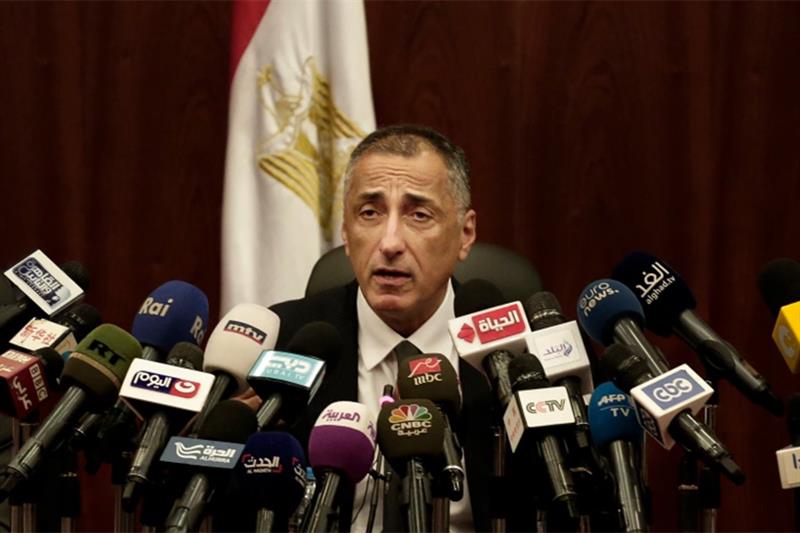
Egyptian Central Bank Governor Tarek Amer . AP
Egypt’s President Abdel Fattah El-Sisi, who accepted Amer’s resignation, appointed Amer as a presidential advisor.
MPC is anticipated to convene on Thursday to review the key interest rates amid the country’s accelerated inflation, the global inflationary wave as well as the spillovers of the war in Ukraine.
Amer was expected to step down on 26 November 2023 to end his second and last four-year term approved in November 2019 by President El-Sisi and then the House of Representatives.
Egypt’s IMF-backed economic reform programme, COVID-19 pandemic, and recently the Russia-Ukrainian conflict have represented significant challenges to Egypt’s monetary policy under the CBE’s chairmanship of Amer.
IMF's $12 bln loan
Lasting from November 2016 through July 2019, Egypt’s economic reform programme –a three-year loan deal under the IMF’s extended fund facility (EFF)– had a significant focus on the country’s monetary policy that has suffered imbalance as well as soaring inflation rates at that time.
Following the $12 billion loan approval, the IMF said that the floatation of the Egyptian pound were critical steps toward restoring confidence in the economy and eliminating foreign exchange shortages.
It added that a new exchange rate regime will be supported by prudently tight monetary policy to anchor inflation expectations, contain domestic and external demand pressures, and allow the accumulation of foreign exchange reserves.
In response, the CBE shocked the Egyptian market by fully floating the Egyptian pound for the first time in years and raising the interest rates by an unprecedented three percent (300 basis points) upon the requirements of the IMF loan deal.
After five reviews on the loan programme, the IMF said that Egypt’s monetary policy remains anchored by the medium-term objective of bringing inflation to single digits.
It also noted that core inflation appears to be well contained, but that the central bank should remain cautious until disinflation is firmly entrenched, adding that the exchange rate flexibility remains essential to improve resilience to shocks and preserve competitiveness.
Following the implementation of the programme, the US dollar trading price against the Egyptian pound jumped from an average of EGP 10 to EGP 19.6, before it started to cool in December 2018 till it reached EGP 15.8 on average in 2021.
COVID-19 impacts
Since March 2020, Egypt has been hit severely by the pandemic shock.
On the monetary policy level, CBE took a package of precautionary and proactive measures to absorb the shock.
These measures included cutting interest rates by a total of three percent (300 basis points) among other procedures aimed at curbing cash transactions and counting more on electronic methods as well as launching a number of initiatives to support the most-hit sectors, such as tourism, industry, SMEs, and agriculture.
As a result of utilising CBE’s net international reserves (NIRs) to meet the local market needs amid the pandemic, NIRs dropped significantly to $37 billion by the end of March 2020, down from $40.9 billion a month earlier.
To address such challenges, Egypt secured two loans from the IMF under the Rapid Finance Instrument (RFI) and the Stand-By Arrangement with a total exceeding $8 billion, along with other loans obtained through other international financial institutions, which all put additional pressure on the country’s budget and raise its debt services.
War in Ukraine
The Russian-Ukrainian conflict has exacerbated the harsh impacts of the pandemic, causing a significant increase in food and energy prices that have been weighing heavily on Egypt’s economy.
Responding to this challenge, the CBE adopted the same policy it applied during the pandemic. It hiked the interest rates by a total of three percent (300 bps) and devalued the Egyptian pound by over 17 percent.
The action was followed by a considerable increase in the US dollar trading price against the Egyptian pound, approximately reaching the same level it recorded upon the implementation of the IMF $12 billion-backed loan.
It is worth noting that 90 percent of the debt investments have fled the local market since the onset of the war, with over $20 billion in investments having exited the market, according to Minister of Finance Mohamed Maait.
Currently, the US dollar price against the Egyptian pound slightly exceeds EGP 19. Besides that, Egypt’s inflation continues its acceleration. It has remained in the double digits zone since March, exceeding seven percent (± two percent) through the fourth quarter of 2022.
Egypt’s headline annual inflation accelerated to 14.6 percent in July – more than double the corresponding month in 2021 – up from 13.2 percent in June, while urban annual inflation also rose to 13.6 percent, the Central Agency for Public Mobilisation and Statistic (CAPMAS) said in August.
As Amer is Egypt’s governor at the IMF, his resignation comes amid multifarious challenges the Egyptian economy is facing along with the ongoing negotiations with the IMF for a fresh loan deal.
Amer said in May that Egypt is expected to secure a limited loan from the IMF as the country, which has obtained over $20 billion from the fund since 2016, went beyond its quota. Talks with the Fund have been underway since March.
He also explained that further borrowing will be subjected to exceptional access criteria that will require the country to follow more stringent conditions.
Short link: